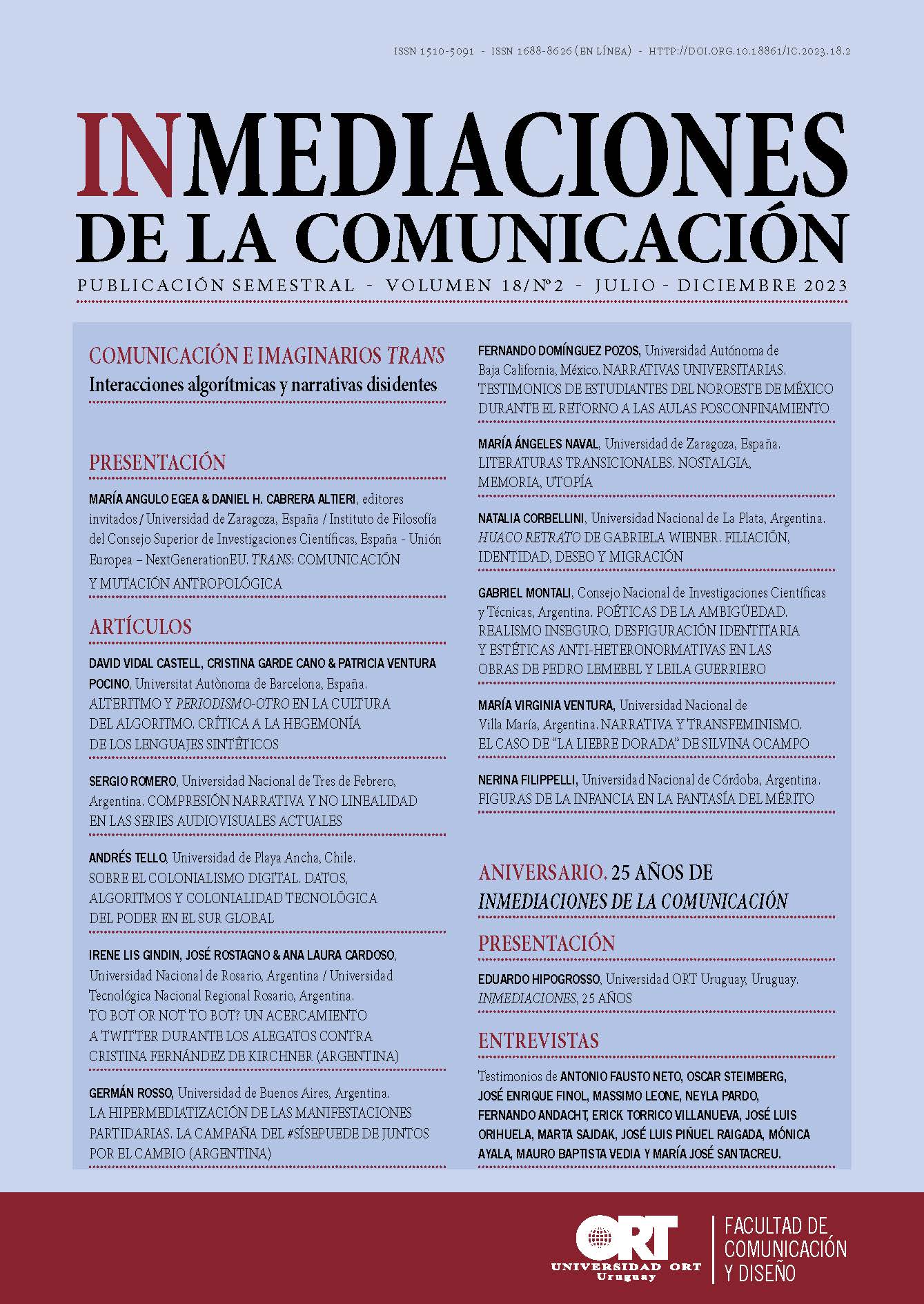Poetics of ambiguity
Insecure realism, identity disfiguration and anti-heteronormative aesthetics in the works of Pedro Lemebel and Leila Guerriero
DOI:
https://doi.org/10.18861/ic.2023.18.2.3516Keywords:
literature, testimony, politics, intellectuals, journalismAbstract
This article analyzes the changes that occurred in the testimonial literature of the Southern Cone after the defeat of the revolutionary projects of the 1960s and 1970s. The hypothesis is that the outbreak of the dictatorships motivated a process of disassembling the testimony in its foundations of truth, coherence and argumentative transparency, at the same time as a progressive reconfiguration of its aesthetic principles from approaches that assumed the concept of ambiguity as a sine qua non condition of literary creation. Within this framework, the article intends to investigate a set of works by Leila Guerriero and Pedro Lemebel and analyze the way in which the redefinition of that narrative genre is shaped. As it emerges from the work, the idea of ambiguity is built –in these authors– through the notion of insecure realism, a category that refers to a state of generalized uncertainty that encompasses all the dimensions of being, from the ideological-political to the those related to sexual gender and the development of writing. Therefore, in the analyzed production of Guerreiro and Lemebel, the implementation of transformative operations of testimony can be observed; operations in which it is possible to identify points in common and also differences.
Downloads
References
Amar Sánchez, A. M. & Basile, T. (2014). Derrota, melancolía y desarme en la literatura latinoamericana de las últimas décadas. Iberoamericana, 80(247), 327-349.
Avelar, I. (2000). Alegorías de la derrota. Santiago de Chile: Cuarto Propio.
Badiou, A. (2005). El siglo. Buenos Aires: Manantial.
Barnet, M. (1966). Biografía de un cimarrón. La Habana: Academia de Ciencias de Cuba.
Basile, T. (2015). Literatura y violencia en la narrativa latinoamericana reciente. La Plata: Facultad de Humanidades y Ciencias de la Educación.
Bernabé, M. (2010). Sobre márgenes, crónica y mercancía. Boletín del Centro de Estudios de Teoría y Crítica, 15, 65-80.
Beverley, J. (1987). Anatomía del testimonio. Revista de Crítica Literaria Latinoamericana, 25(13), 7-16.
Bonano, M. (2020). Las crónicas de Leila Guerriero y las modulaciones de la voz. Mirada, subjetividad y autoficción. Perífrasis, 22(11), 100-111. Recuperado de: https://revistas.uniandes.edu.co/doi/full/10.25025/perifrasis202011.22.06
Chiani, M. (2014). Lecturas de la derrota y el fracaso en la producción narrativa y crítica de Marcelo Cohen. Iberoamericana, 80(247), 399-432. Recuperado de: https://revista-iberoamericana.pitt.edu/ojs/index.php/Iberoamericana/article/view/7157
Carnovale, V. (2011). Los combatientes, historia del PRT-ERP. Buenos Aires: Siglo XXI.
Echevarría, I. (2013). Prólogo. En Echevarría, I. (Comp.), Pedro Lemebel. Poco hombre: crónicas escogidas (pp. 11-31). Santiago de Chile: Universidad Diego Portales.
Galeano, E. (1971). Las venas abiertas de América Latina. Buenos Aires: Siglo XXI.
Gilman, C. (2012). Entre la pluma y el fusil. Buenos Aires: Siglo XXI.
Guerriero, L. (2009). Frutos extraños. Buenos Aires: Aguilar.
Guerriero, L. (2018). Plano Americano. Buenos Aires: Anagrama.
Guerriero, L. (2014). Zona de obras. Buenos Aires: Anagrama.
Guevara, E. (1963). Pasajes de la guerra revolucionaria. La Habana: Unión.
Lemebel, P. (2013a). La esquina es mi corazón. En Echevarría, I. (Comp.), Pedro Lemebel. Poco hombre: crónicas escogidas (pp. 58-61). Santiago de Chile: Universidad Diego Portales.
Lemebel, P. (2013b). Las amapolas también tienen espinas. En Echevarría, I. (Comp.), Pedro Lemebel. Poco hombre: crónicas escogidas (pp. 184-187). Santiago de Chile: Universidad Diego Portales.
Lemebel, P. (2013c). Los duendes de la noche. En Echevarría, I. (Comp.), Pedro Lemebel. Poco hombre: crónicas escogidas (pp. 70-71). Santiago de Chile: Universidad Diego Portales.
Lemebel, P. (2013d). Manifiesto, hablo por mi diferencia. En Echevarría, I. (Comp.), Pedro Lemebel. Poco hombre: crónicas escogidas (pp. 35-39). Santiago de Chile: Universidad Diego Portales.
Ludmer, J. (2009). Literaturas postautónomas 2.0. Propuesta Educativa, 32, 41-45. Recuperado de: https://www.redalyc.org/pdf/4030/403041704005.pdf
Maccioni, M. L. (2011). Líneas de fuga. Literatura y política en Reinaldo Arenas y Juan José Saer (1960-1975). Ann Arbor: Proquest.
Montali, G. (2021). A cincuenta años de Las venas abiertas de América Latina. Un análisis del estilo y la estrategia de escritura de Eduardo Galeano. Cuadernos del Cilha, 35, 1-37.
Montali, G. (2019). Escribir desde la tensión. Conflictos político-ideológicos en la producción intelectual de Eduardo Galeano y Francisco Urondo: 1955 y 1976. A contracorriente, 16(2), 9-39.
Montes, A. (2014). Políticas y estéticas de la experiencia urbana en la crónica contemporánea. Buenos Aires: Corregidor.
Ponza, P. (2010). Intelectuales y violencia política 1955-1973. Córdoba: Babel.
Rotker, S. (1995). La invención de la crónica. Buenos Aires: FCE.
Saítta, S. (2009). Del compromiso político a la crítica social en treinta años de literatura argentina. Ayer, 73(1), 133-157.
Sarlo, B. (2005). Tiempo pasado. Buenos Aires: Siglo XXI.
Sklodowska, E. (1992). Testimonio hispanoamericano: historia, teoría, poética. Nueva York: Peter Lang.
Yúdice, G. (1992). Testimonio y concientización. En Achugar, H. & Beverley, J. (compiladores), La voz del otro, testimonio y subalternidad (pp. 221-242). Guatemala: Latinoamericana Editores.






